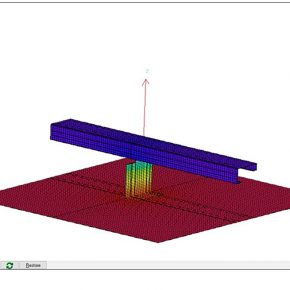
ABC&D ARTICLE: Building for better construction
The construction sector was making the front pages at the start of the year, with headlines highlighting a boost for the industry post-election. After the most recent budget, (and COVID-19 not withstanding) we can hope to see some very exciting programmes launched, from housing developments to big infrastructure. Charlie Ayers, managing director at SureCav, explains in April’s edition of ABC&D magazine…
“Certainly, it’s encouraging to see that UK construction and building products manufacturing is starting to recover after a tough few years, exacerbated by Brexit uncertainty, a skills shortage and a rise of cheap imports.
Hopefully we can overcome the new challenges posed by the current Coronavirus crisis in the coming months. Focusing on current trends in the UK construction sector, I’ve noticed that an increasing awareness of sustainable practices and eco-friendly products is starting to drive design and material specification decisions.
Equally, the promise of a simpler, but tougher regulatory framework and body towards the end of 2020 promises to deliver a safe and secure construction journey.
I have noticed many architects, contractors, developers and manufacturers sitting up and taking note. This will no doubt influence the way many companies operate as we go forward into the next decade.
Here I would like to take the opportunity to explore these in a little more detail, divining the direction our industry is taking.
Sustainable solutions
Built environment professionals are increasingly looking to home-grown products for their builds.
It’s a shift in focus which is to be equally welcomed and encouraged by UK building product manufacturers who stand to benefit commercially.
However, there are a number of other good reasons to source domestically and, even better, regionally. Financial benefits aside, locally-sourced materials have reduced environmental impact due to lower shipping costs.
We should remember ocean and road freight are massive carbon emitters and contractors should be looking to reduce their usage of these, particularly if they want to meet 2050 net-zero carbon targets.
I also think the trend for sourcing systems and solutions closer to home has been a marked improvement in quality control over the last couple of years and, looking to the future, we will see even tighter regulations and testing.
This can only guarantee both quality and safety, as well as establish a framework for appropriate specification, and serve as further endorsement for construction businesses to buy British.
I am sure this will be the case across other manufacturing industries.
Local hero
Finally, on a human level, the boost in manufacturing and construction, and an increase of domestic orders, will provide essential support to many communities across the UK which have been hit hard over the last decade.
Traditionally, manufacturing and construction provided the economic lifeblood and social cohesion in many areas now suffering from crime, poverty and lack of opportunity.
If this upward trajectory continues, it will provide the societal resuscitation many of these urban and rural locations need, helping them both rebuild and restructure.
The North-South divide will be much talked about over the next few years. Re-establishing our manufacturing base and supporting the construction sector, particularly through big infrastructure, has the potential to close the gulf.
Let’s hope this is an indicator of long-term regeneration, not a flash in the production pan.
Robust regulation
NBS’s Construction Product Leaders’ Summit, which took place in February 2020, raised another important issue which is going to significantly impact the construction and building products industry: regulation.
I’m pleased to see the sector is finally waking up to the new and urgently needed regulatory framework.
In this nascent landscape, accreditation from recognised bodies, such as the aforementioned NBS, BBA, NHBC, BRAC and BRE, will be essential requirements pre-specification.
For too long, cheap, badly made, structurally weak and poor performing materials have been allowed to flood the market. This has to stop now.
The construction sector has a social responsibility to stamp out and prevent regulatory work-arounds and bypassing.
In 2020 we have the ability to become a country of best practice, a global leader in construction safety and building product excellence.
All recommendations from Dame Hackitt’s Report are being implemented and are set to become statute in the next year. I hope the new housing minister takes this opportunity to engage with all across the built environment and be a vocal champion of tougher regulation, endorsing official accreditation from trusted professional bodies as a mark of quality.
So two major issues, sustainability and regulation, are set to dominate the agenda over the course of this year. Of course, it will encourage a complete rethink of many business models in the sector. However, I believe the initial, upfront cost will be worth it.
If I was to suggest a word which will define construction over the next couple of years it would be ‘security’. This looks beyond the basic safety of a building and considers our longterm environmental, economic and societal welfare.
Fundamentally, adopting an holistic view of this concept will be the only way in which we can secure success and longevity for our sector.”
Latest news

26th July 2024
Enfield Speciality Doors completes world-class project for Atlas Copco HQ
A rundown office and warehouse building completely transformed into a modern headquarters for Atlas Copco has been fitted with more than 120 internal fire doors from Enfield Speciality Doors.
Posted in Access Control & Door Entry Systems, Articles, Building Industry News, Building Products & Structures, Building Systems, Case Studies, Doors, Interior Design & Construction, Interiors, Posts, Restoration & Refurbishment, Retrofit & Renovation, Security and Fire Protection, Sustainability & Energy Efficiency, Timber Buildings and Timber Products, Wooden products
26th July 2024
Abloy UK launches new white paper
Abloy UK, a leading provider of security and access control solutions, has launched a new white paper.
Posted in Access Control & Door Entry Systems, Architectural Ironmongery, Articles, Building Industry News, Building Products & Structures, Building Services, Doors, Facility Management & Building Services, Health & Safety, Information Technology, Innovations & New Products, Publications, Research & Materials Testing, Security and Fire Protection
26th July 2024
MCRMA Member Profile: David Roy, Director of Roofconsult
David Roy of MCRMA member company Roofconsult has more than 50 years’ experience to draw upon working in the building envelope sector and a unique perspective on how it has changed in that time.
Posted in Articles, BIM, Infrastructure & CAD Software, Building Associations & Institutes, Building Industry News, Building Products & Structures, Building Services, Building Systems, Cladding, Information Technology, Restoration & Refurbishment, Retrofit & Renovation, Roofs, Walls
26th July 2024
Strand: Enhancing Door Functionality and Safety
Craig Fox, Sales Director for Strand Hardware, outlines how door industry professionals might apply door limiting stays…
Posted in Architectural Ironmongery, Articles, Building Industry News, Building Products & Structures, Building Services, Doors, Facility Management & Building Services, Health & Safety, Restoration & Refurbishment, Retrofit & Renovation
 Sign up:
Sign up: